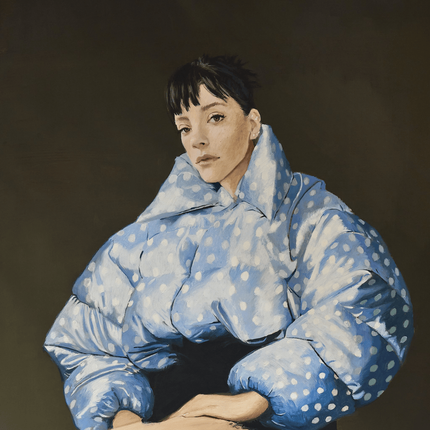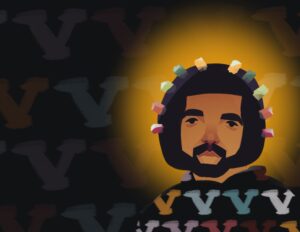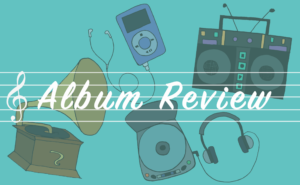In a 2023 interview on The Jonathan Ross Show, Lily Allen commented on her hesitation to perform with pop it girl Olivia Rodrigo as her Glastonbury guest in 2022. “I was slightly expecting for her to introduce me and people to be like ‘what…who?’” she admitted. Despite her hesitation, Allen’s guest performance was a stand-out success and what she would later cite as her inspiration to return to music.
About a year later, Allen released West End Girl (2025), her first album after a six-year hiatus, written in just two weeks. The album chronicles Allen’s complicated marriage to actor David Harbour, following their 2024 separation, in explicit detail. The album reflects deeply on Allen’s experience being pressured into an open relationship by her husband and the subsequent anxiety, self-doubt, and anger that she felt. She confronts this vulnerable subject matter with a candor that is strikingly direct. Each song on the track list unfolds aspects of the story in near-chronological order, and the lyrics themselves are brutally conversational, making her pointed messages unmistakably clear.
The record opens with the titular track, “West End Girl,” which, with soft humming and a bossa nova-inspired beat in the background, establishes a deceptively hopeful tone. The lyrics follow suit, describing the honeymoon stage in her relationship, as the newlyweds buy a home and begin building a life together. However, the mood begins to shift when Allen describes being offered a role in a West End play, a moment her husband immediately dismisses: “That’s when your demeanour started to change / You said that I’d have to audition, I said ‘You’re deranged.’” As Allen jets off to London to become a “West End Girl,” she chooses to ignore her husband’s apathy and revel in her independence, but that freedom slowly turns into loneliness. She writes, “Now I’m in London, I’m on my own,” a refrain that evolves into, “Now I’m in London and I’m all alone.”
The track concludes with a two-minute outro, where Allen narrates her end of a phone call. While we don’t hear what she is told by the person on the other end of the call, presumably her husband, we can hear her voice slowly become more disappointed as she admits, “I mean, it doesn’t make me feel great,” but later reassures him, “I’m fine, I just … I want you to be happy.”
The mystery of the news she receives on the phone call doesn’t last very long, however, as the song transitions into “Ruminating,” a fast-paced hyper-pop song about the whirlwind of emotions that follow. She sings about anxiously imagining her husband with another woman, and it becomes clear that she has been asked about opening up their marriage during her time in London. The lyrics are repetitive and restless as she recalls parts of their conversation and subsequently spirals into panic. The song culminates as she recounts: “And then you came out with this line, so crucial / Yeah, ‘If it has to happen, baby, do you want to know?’”
In these two songs, alongside subsequent tracks, Allen opts for a style of lyricism that embraces acute specificity. On “West End Girl” and “Ruminating,” she gives us direct quotes. On “Tennis” and “Madeline,” she names names (“Madeline”). On “4chan Stan,” she lists a date (“May ’24”). Rather than following the conventional pop style—keeping details vague to prioritize relatability—Allen writes with a sharp, honest pen that places the listener in a gossip session or in a theatrical script. Her writing is confessional, heartfelt, and angry, and she refuses to sacrifice detail for the sake of universality, flow, or rhyme.
This choice could easily go south for many songwriters. If done wrong, this freestyle lyricism could result in a product that’s not raw and forthcoming but straight-up sloppy. What sets Allen apart in this aspect is her intentionality. She’s not writing this way out of carelessness. She’s writing to be direct. While flowery language can be an asset to many bodies of work, West End Girl wouldn’t be the compelling piece of storytelling that it is without Allen’s dedication to telling her whole truth, no matter how blunt or jarring.
The conversational tone also lends itself to another key element in Allen’s greater discography: snark. Even in a record steeped in emotions of hurt and resentment, Allen finds time for the sarcastic humor that is a staple in her past projects, often taking on the perspective of the different characters in her story. In “Dallas Major,” for example, she assumes the persona of “Dallas Major,” representing the version of herself that she projects on online dating sites. As Allen tries—but ultimately fails—to enjoy her open marriage, she struggles to balance the sexy, unfettered image on her profile with the boring, undesirable, middle-aged woman she perceives herself as. She sings about how she is “almost-nearly forty” and “just here for validation” before teasingly asking, “Does that sound like fun to you?”
Further committing to vulnerability, Allen details her internal grappling with her open relationship through complex and, at times, poetic discussions of sex. Particularly, she illustrates her desire to fit her husband’s every fantasy, weaving between roles to maintain his attention. She often plays around with stereotypically sexualized parental dynamics, placing herself within multiple, dueling personas.
“Tennis” opens with a swinging beat you’d find in a kindergarten classroom as Allen coos, “Daddy’s home for the first time in weeks / Got the dinner on the table / Tell the kids it’s time to eat / And I made my baby’s favorite / But he didn’t seem to care.” A wealth of complex contradictions lies within just these few first lines, as Allen jumps between mother figure, cooking dinner for her baby, and child, eager for her “daddy” to come home.
We see this sexual roleplay come up once again in “Nonmonogamummy.” Here, Allen begs her husband to let her be his “Nonmonogamummy / I’m just trying to be open,” alluding to her agreement to an open relationship to allow her husband to fulfill his sexual needs. Allen’s word play here, reflected in the striking title, is impeccably effective in illustrating a partner willing to bend their entire perception of a relationship in order to preserve it. “I don’t wanna fuck with anyone else, I know that’s all you wanna do / I’m so committed that I’d lose myself ‘cause I don’t wanna lose you, you you,” she aches. These juxtapositions so achingly encapsulate the flawed logic that Allen’s relationship has forced her into, and her persisting will to maintain its breaking parts.
Ultimately, despite her efforts to fit every sexual role her husband desires of her, she realizes, in perhaps one of the more cutting tracks on the album, “Sleepwalking,” that she’s tied herself to a person who no longer desires her. “I know you’ve made me your Madonna / I wanna be your whore,” she growls in the wonderfully dark bridge, lined with thick guitar reverberations. Using the Madonna-Whore structure, she implies that her marriage’s passion can only exist if Allen degrades herself, hence her never-ending efforts to conform to his perverted sexual whims.
“Pussy Palace” more graphically depicts her realization of her husband’s sexual escapades, in which she reels at the discovery of his “pussy palace—I always thought it was a dojo, dojo.” This is no metaphor; Harbour was allegedly a martial arts enthusiast and had a dojo in their flat, which Allen later came to discover as the site of his infidelity.
Allen’s plain references to sex read as all the more grotesque when followed by her more profound expressions of heartbreak. “Duane Read bag with the handles tied / Sex toys, butt plugs, lube inside,” she lists, in a blasé monotone, her husband’s disconcerting purchases, disguised as any domestic shopping trip to the pharmacy. In the following lyrics, she attempts to cut through the desensitization, accusing, “Hundreds of Trojans, you’re so fucking broken / How’d I get caught up in your double life?” While this line is certainly damning, Allen’s slight use of autotune and her decision to practically speak the lines instead of singing them convey a kind of resignation. Lyrics that may be jarring to the listener, to Allen, are part and parcel of a troubled relationship she’s labored to understand for years.
Her discussion of sex is refreshingly complex and intellectual, yet still intimately relatable. Many of us have vowed to be whatever the person we love wants us to become; Allen poignantly illustrates this psychology of despairing dedication, only to reveal the person never wanted her in the first place.
On West End Girl, Allen never pretends to be completely healed from her marriage’s trauma. But the album’s narrative arc, packed with gut-punching insight and damning evidence, comes to a triumphantly obvious conclusion: “It’s not me, it’s you.” Both a callback to her second studio album of the same title and clever play on the classic break-up excuse, “It’s not you, it’s me,” Allen refuses to blame herself for the pain she’s endured. On the contrary, after enduring every slight and scrutinizing her every move, Allen realizes that her husband’s failings are his burden to carry. All that is within her control is her perspective and her pen, and it is with these tools that she emerges on the other side as the winner.
Voice’s Choices: “West End Girl,” “Pussy Palace,” “Dallas Major”







